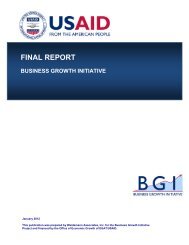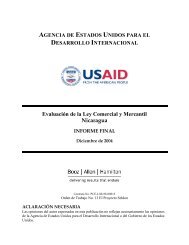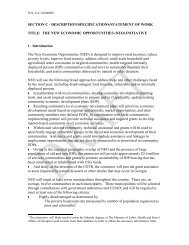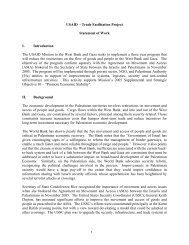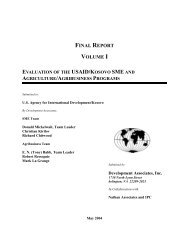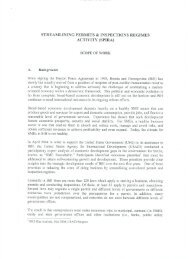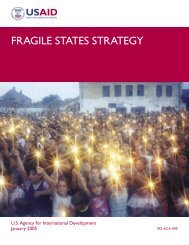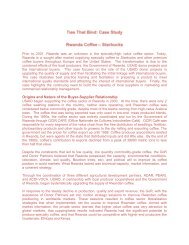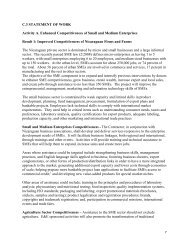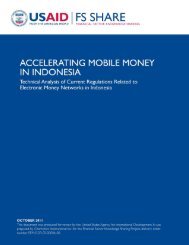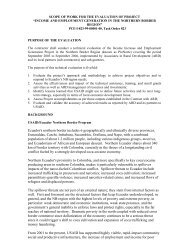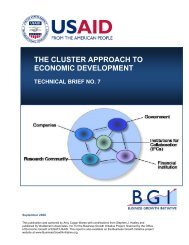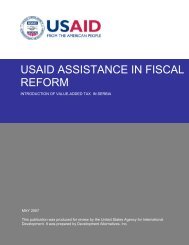Trade and Commercial Law Assessment - Honduras - Economic ...
Trade and Commercial Law Assessment - Honduras - Economic ...
Trade and Commercial Law Assessment - Honduras - Economic ...
Create successful ePaper yourself
Turn your PDF publications into a flip-book with our unique Google optimized e-Paper software.
TRADE AND COMMERCIAL LAW ASSESSMENT DECEMBER 2004HONDURASC. IMPLEMENTING INSTITUTIONSThe LdP created the Instituto de Propiedad as an independent body to govern the registration ofreal property. This entity will oversee real property registries, which are now dependencies of theSupreme Court.The registry of Tegucigalpa, which has authority over property <strong>and</strong> commercial matters, is inpoor condition. Within the registry, transactions are recorded manually by staff in books inwhich information is indexed according to the persons involved in the transaction (i.e., foliopersonal). The registry’s books are kept in an insecure form, <strong>and</strong> some of the books are damaged<strong>and</strong> contain loose documents. The registry is not automated <strong>and</strong> only two computers, used forword processing, are present in the facility. Inadequate staffing exacerbates the lack ofautomation. According to interviewees, a permanent staff of 59 employees is responsible forprocessing, by h<strong>and</strong>, the 400 documents received daily.Registration of property can take as long as 3 months, <strong>and</strong> submission of a cadastre map is notrequired. Because of uncertainty regarding procedures during the current transition period, theregistry has continued to operate under the old property system.Some lawyers interviewed complained that the LdP has created chaos during the transitionperiod. One lawyer stated that, although the new law states that registry fees should be 1.5percent of l<strong>and</strong> value, the old 3-percent fee is still charged because of poorly trained staff <strong>and</strong>lack of supervision. Evidence of poor training is found in the comments of registry employees,who said that even though property transactions should be recorded in a pre-written form basedon the new law, they would reject a transaction presented in such a form. <strong>Law</strong>yers alsomentioned that the new law’s creation of the Instituto de Propiedad creates additionalbureaucracy for which the government lacks funds. The presidential commission for propertyreform disputes the notion that the Instituto de Propiedad increases bureaucracy <strong>and</strong> maintainsthat the new body will have sufficient funds to modernize registries <strong>and</strong> pay registry employeesbased on the increased number of property transaction registrations that will result from thereform.The LdP is intended to be fully in force by January 2005. According to the plan outlined for thetransition period during the last quarter of 2004, registries will be evaluated, staff will bechanged <strong>and</strong> trained, <strong>and</strong> the society at large will be advised about the benefits <strong>and</strong> changesassociated with the LdP. At the State Reform Commission, it was reported that it would takefrom 2 to 3 years to strengthen the property system.Registering Property (2004)The ease with which businesses can secure rights to property is measured below using the followingindicators: the number of procedures necessary to transfer a property title from the seller to the buyer <strong>and</strong>the time <strong>and</strong> the costs as a percentage of the property valueIndicator<strong>Honduras</strong>RegionalAverageOECDAverageNumber of procedures 7 6 4Time (days) 36 56 34Cost (% of property per capita) 8.8 5.6 4.9V-4



